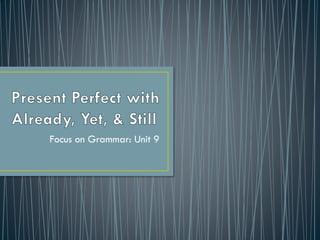Present Perfect with Already, Yet, & Still
•Télécharger en tant que PPTX, PDF•
15 j'aime•20,437 vues
Present Perfect with Already, Yet, and Still for ESL students. Based on Focus on Grammar 3's Unit 9.
Signaler
Partager
Signaler
Partager

Recommandé
Contenu connexe
Tendances
Tendances (20)
Similaire à Present Perfect with Already, Yet, & Still
Similaire à Present Perfect with Already, Yet, & Still (20)
present perfect simple and continuous for Italian students

present perfect simple and continuous for Italian students
Dernier
This presentation was provided by William Mattingly of the Smithsonian Institution, during the third segment of the NISO training series "AI & Prompt Design." Session Three: Beginning Conversations, was held on April 18, 2024.Mattingly "AI & Prompt Design: The Basics of Prompt Design"

Mattingly "AI & Prompt Design: The Basics of Prompt Design"National Information Standards Organization (NISO)
This presentation was provided by William Mattingly of the Smithsonian Institution, during the fourth segment of the NISO training series "AI & Prompt Design." Session Four: Structured Data and Assistants, was held on April 25, 2024.Mattingly "AI & Prompt Design: Structured Data, Assistants, & RAG"

Mattingly "AI & Prompt Design: Structured Data, Assistants, & RAG"National Information Standards Organization (NISO)
Dernier (20)
Mattingly "AI & Prompt Design: The Basics of Prompt Design"

Mattingly "AI & Prompt Design: The Basics of Prompt Design"
Russian Escort Service in Delhi 11k Hotel Foreigner Russian Call Girls in Delhi

Russian Escort Service in Delhi 11k Hotel Foreigner Russian Call Girls in Delhi
Mattingly "AI & Prompt Design: Structured Data, Assistants, & RAG"

Mattingly "AI & Prompt Design: Structured Data, Assistants, & RAG"
Kisan Call Centre - To harness potential of ICT in Agriculture by answer farm...

Kisan Call Centre - To harness potential of ICT in Agriculture by answer farm...
Z Score,T Score, Percential Rank and Box Plot Graph

Z Score,T Score, Percential Rank and Box Plot Graph
Beyond the EU: DORA and NIS 2 Directive's Global Impact

Beyond the EU: DORA and NIS 2 Directive's Global Impact
Disha NEET Physics Guide for classes 11 and 12.pdf

Disha NEET Physics Guide for classes 11 and 12.pdf
Measures of Dispersion and Variability: Range, QD, AD and SD

Measures of Dispersion and Variability: Range, QD, AD and SD
A Critique of the Proposed National Education Policy Reform

A Critique of the Proposed National Education Policy Reform
Present Perfect with Already, Yet, & Still
- 1. Focus on Grammar: Unit 9
- 2. • Something that began in the past • That continues to the present • (May or may not continue into the future) •I have lived in Glendale for six months. •I have been a teacher for 12 years. •I have studied English since high school.
- 3. • Use already, yet, & still to talk about things that happened at an indefinite (not exact) time in the past • *The past event is important to the present moment • Example: I have seen Movie X. • (happened in the past at an indefinite time) • Example: Do you want to watch Movie X or Movie Y? • I have already seen Movie X, so let’s watch Movie Y. • (the past is important to the present decision) • (it’s not important when you saw Movie X)
- 4. • The past event is important to the present moment • We’re talking about something in the recent past • These words show our expectation or feelings
- 5. • Use it with something that happened earlier than expected • Example: • You’ve already finished Exercise 2? • (We’re doing it tonight for homework, so you finished it earlier than expected) • Other examples?
- 6. • *Sometimes “already” suggests that there is no need for repetition • Example: • A: We should invite Laura to the party. • B: I’ve already called her. • (You don’t need to call her again.)
- 7. • Use it to check if something has happened before now • *We often use this when we expect that something has happened or will happen soon • Example: • Have you finished your essay yet? • (I expect that you have finished or will finish soon)
- 8. • Use it to show that something that was expected has not happened • Example: • She hasn’t finished her essay yet. • (I expected her to finish it because it’s due today)
- 9. • Use it to talk about something that hasn’t finished • We use this when we expected something to finish earlier (similar to “not yet”) • *Shows the speaker is surprised or unhappy • Example: •He still hasn’t finished his homework. (I expected it to be finished; I’m unhappy.)
- 10. • Still is also used to show that something continues • *This meaning is not used with present perfect • Example: • I am still working at Kohl’s. • Do you still want to have lunch tomorrow?
- 11. • Already: earlier than expected • Between “have/has” and the past participle (She has already eaten.) • At the end of the clause (She has eaten already.) • Yet: something expected hasn’t happened; check if something happened • Usually at the end of the clause (I haven’t eaten yet.) • Still: something hasn’t finished • Before “haven’t/hasn’t” (They still haven’t eaten.)
- 12. • Make sentences about the To Do list using “already,” “yet,” and “still.” Work with a partner.
- 13. • 1. Have you tried it yet? • Yet (question): Check if something happened before now • 2. We have already met. • Already: happened earlier than expected • 3. I have already had three cups! • Already: no need for repetition; important to present moment • 4. Has Jenna left already? • Already: happened earlier than expected • 5. Have you seen Tarantino’s new movie yet? • Yet (question): Check if something happened before now • 6. I have already planned the whole thing… • Already: happened earlier than expected